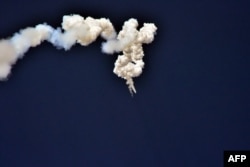The United Nations Security Council has called another emergency session to address North Korea's latest ballistic missile test.
Uruguay's mission to the world body said the meeting, the second in as many weeks, is set for Tuesday and was requested by the United States, South Korea and Japan.
South Korean analysts said the latest missile was fired Sunday afternoon from South Pyeongan province and traveled about 500 kilometers before landing in the Sea of Japan.
A South Korean joint chiefs statement said, "Our military is closely monitoring signs for additional provocation by the North Korean military and we are keeping a full military readiness." A separate statement from the U.S. Pacific Command highlighted "our ironclad commitment to the security of our allies in the Republic of Korea and Japan."
The U.S. statements came as South Korean President Moon Jae-in convened a National Security Council meeting to discuss the missile launch, which Japanese Prime Minister Shinzo Abe called a "challenge to the world."
The statements also coincided with North Korean claims that it is now ready to mass produce and deploy intermediate range ballistic missiles.
10th N. Korean launch this year
Sunday's test fire is the 10th launch by Pyongyang this year, as it presses to gain global recognition as a nuclear power. Western experts have identified seven of the rockets as intercontinental ballistic missiles, and said the remainder had not been conclusively identified.
Analysts say the missile launched last week traveled in an unusually high trajectory, indicating that it might be a new two-stage liquid fueled rocket capable of flying up to 4,500 kilometers.
The Security Council responded to that launch with a lengthy statement of condemnation that also threatened to impose fresh sanctions on the North for its "flagrant and provocative defiance" of earlier demands to end all nuclear testing.
So far, those warnings and repeated statements of condemnation have had little outward impact on Pyongyang, as it continues to defy Western warnings and pursue its nuclear ambitions.
History of defiance
Pyongyang conducted two unauthorized nuclear test explosions last year and about two dozen rocket launches.
Pyongyang has been under U.N. sanctions since 2006, along with an international arms embargo aimed at slowing the development of its banned nuclear and missile programs.
Since then, Washington and a host of world governments have repeatedly demanded that the North denuclearize the Korean peninsula. However, world leaders have yet to devise a plan that would either compel the North to cooperate or create incentives for it to do so.






